Reading the election manifestos? DUB did it for you
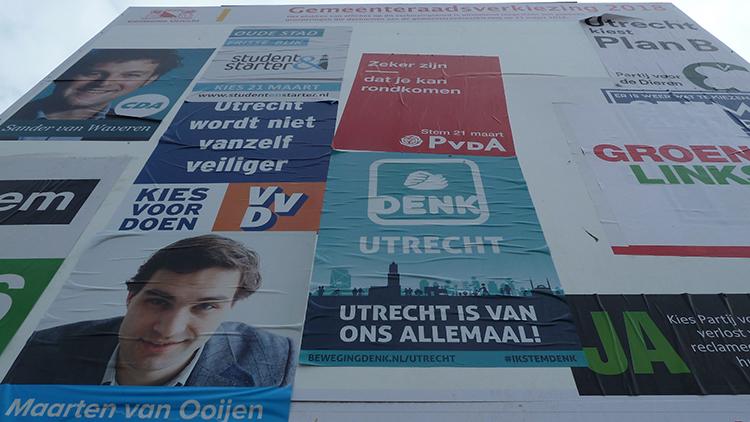
Students should be able to loan 10.000 euros a year from the city of Utrecht, if one man party Marcello van de Wal gets his way after the elections. The party Student & Starter wants to get students to visit the gym more often. Not to work out – but to study. They think that it’s possible to relieve the pressure on the university library during rush hour by using gyms as study spots during quiet hours. The local senior party wants to help students with anything you don’t learn at uni or from college books. They want to link students to elderly people, to guide young people with “everything else that’s necessary in life”.
Those are just a few of the points you’ll find in the manifestos of all sixteen parties participating in the municipal elections in Utrecht. DUB took a closer look at all of them, and made an overview of all the points that are relevant for students, in the areas of: student housing, De Uithof, mobility, and safe night life. We also made a list of bonus positions that don’t fit in any of the above boxes, but are still relevant.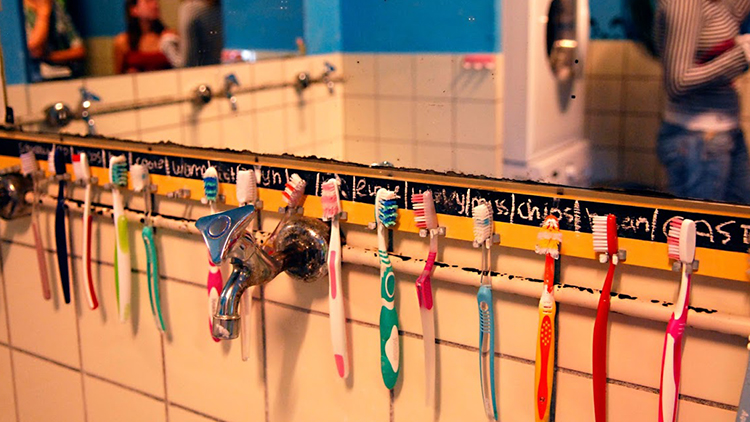
Student housing
The HU and UU together have around 70.000 students. Many of them want to live in the city, but finding affordable housing is easier said than done. International students apparently had to set up tents at a campsite because they were unable to find rooms, and every year, some international students are said to have leave the country for that very reason. (Inter)national students who do manage to find a room, often pay hundreds of euros too much every month, according to the housing team, and if you complain about it, it can easily lead to nasty situations with landlords. Calculations on the size of the housing gap in Utrecht vary, but no one can deny that it’s an issue.
Almost all parties write about the lack of affordable housing for students and people new to the job market. The Partij voor de Dieren says the city should give ‘special attention’ to ‘affordable housing for vulnerable groups, like single parents, young people and the elderly.’ The PVV stresses that the city should ‘guarantee more affordable student housing’, but neither party explains how the problem should be solved.
The ChristenUnie tries to find a solution in speeding up construction production and repurposing office buildings to apartments. The latter is popular among parties. Parties Denk, GroenLinks, VVD, D66, Student & Starter and Stadsbelang Utrecht also want to make it easier to turn empty office buildings and old warehouse districts into housing for, among others, students.
Stadsbelang wants to lessen penalties for home owners who rent out more than two rooms in their house to students. The party suspects that due to those fines, an unnecessary high number of available rooms is not rented out at the moment. Student & Starter proposes to make it easier for home owners to turn houses into apartments, studios and rooms. They want to make the policy for splitting and converting houses more flexible. Stadsbelang Utrecht is also a proponent of splitting existing houses into multiple smaller housing units, because “everything points to an excess of family homes in the city”. The Piratenpartij warns that repurposing family homes is not the solution, but will simply cause the problem to shift. The SP, on the other side, is campaigning for stricter rules for renting rooms to students, and monitoring the compliance with those rules more. Party Evenwicht is also generally a proponent of fewer rules, but not when it comes to renting rooms to students. “The question of renting out student rooms is whether fewer rules wouldn’t just give slumlords more freedom.”
Some of the parties think the solution lies in expanding the number of “co-habitating projects”. Seniorenpartij Utrecht states that the demand for care of many people with (early) dementia could be met if they lived together with students. “The idea is that those students could do things for and with the elderly people for about ten hours a week: think of grocery shopping, drinking a cup of coffee together. In exchange, the students will get to rent at a much lower price.” GroenLinks, the Piratenpartij and Evenwicht also suggest similar ideas.
Other points on the subject of student housing:
- PVV: in assigning houses, people born and bred in Utrecht should be given priority, just like people who have lived in Utrecht for 15 years or longer.
- Student & Starter: It should be made possible for friends to rent a house together. So-called ‘friends contracts’ could relieve the pressure on social and cheaper rentals.
- ChristenUnie: Student housing should become more energy efficient. By making the bills for gas, water and electricity clearer, students may be more motivated to live in a more energy-efficient way.
- GroenLinks: International students should receive housing from educational institutions.
- CDA: When building new homes, we should focus on families.
- PvdA: The city should collaborate with Utrecht University and the Utrecht University of Applied Sciences to provide more affordable student housing.
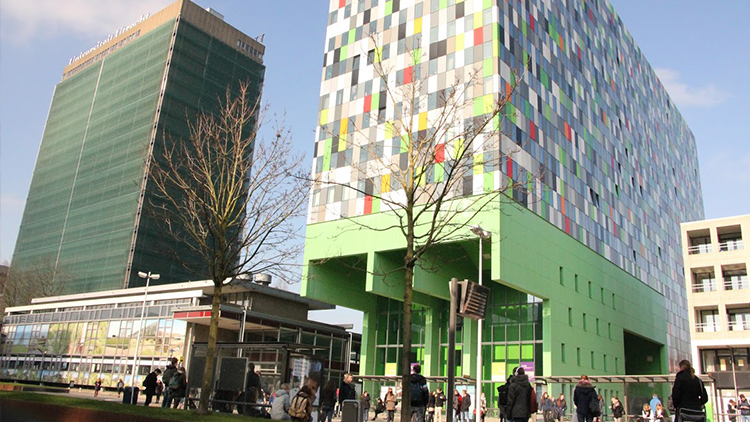
De Uithof
In the lead-up to the municipal elections, the university wrote down five ‘UU issues’. These are points the university would like to see discussed by the city council. One of them is that the university would like the city to regard De Uithof as Utrecht’s eleventh district. That would open up possibilities for social services. The university says it’s “high time”, because De Uithof is increasingly becoming a place that combines living, working, and recreation: “the reality of having almost 3,000 inhabitants, around 25,000 people working here and around 60,000 students calls for this action.”
Although De Uithof is an important theme for the university, it’s not something we see reflected much in the election manifestos. The Piratenpartij, SP, Seniorenpartij, PvdA, Evenwicht and Denk don’t mention De Uithof as a district at all. Stadsbelang Utrecht exclusively mentions being proud of Utrecht Science Park (USP); the PVV stresses mostly that De Uithof has an “important position”, and the VVD says they support initiatives like the USP. Whenever De Uithof is mentioned, it’s usually in the context of the tram line. D66 is the only party that mentions officially making USP a district. “In the coming years, the campus should grow to become Utrecht’s eleventh district, with many more facilities.” The CDA adds that the municipality should keep striving to make De Uithof into a true community, for example by realizing a variety of shops for students and employees.
The PVV does mention a expansion of De Uithof, without explicitly mentioning the term ‘eleventh district’. The party thinks the city should ‘guarantee’ the expansion of De Uithof. The Partij voor de Dieren stresses that expansion, new construction and infrastructure plans of De Uithof should not cause any damage to the ecologically important green zones.
Other points concerning De Uithof:
- Student & Starter: Utrecht Science Park should offer more space for companies and start-ups to settle.
- GroenLinks: De Uithof should have a neighborhood team for students facing problems.
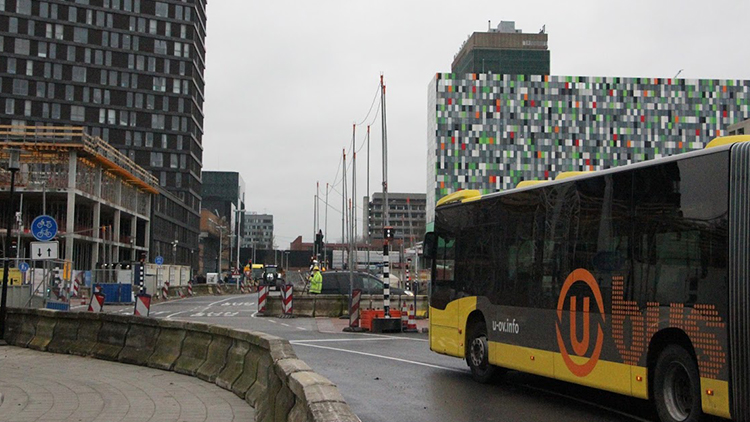
Mobility
Will you still be allowed to ride your bike in the city center in the future? When will you be able to take the tram to De Uithof? Is De Uithof tram going to be sufficient to replace the over-crowded buses in Utrecht? And how are you going to get home after a night out? Right at the top of the university’s list of ‘UU issues’ is the substantial improvement of the accessibility of and within Utrecht. Mobility issues are threatening to turn Utrecht into a region no one can reach. The UU says neighboring municipalities also play a role in this, and therefore the topic should also be high on the agendas of Amersfoort, Bunnik, De Bilt, Zeist, Houten, Nieuwegein and Stichtse Vecht.
The parties in Utrecht are mostly looking at mobility within the city. They focus a lot on pedestrians and cyclists. They need to be given more space, according to GroenLinks, Piratenpartij, PvdA, ChristenUnie, Student & Starter and D66. The Piratenpartij, for example, writes that in Utrecht the pedestrian is the most important, followed by the cyclist, then public transport, and finally, car drivers. As a result, GroenLinks would like to see the city center be made car-free. That goes exactly against the opinion of Denk, which states the city center should be made more easily accessible by car and public transport. The CDA would also like to see the city center stay accessible for all kinds of transport.
Aside from that, D66 and Student & Starter would like to create a train station at De Uithof. “Utrecht is the only city in the Netherlands that only has one junction for public transport, the Central Station,” D66 writes. “We want to add at least one more. A second intercity station at Utrecht Science Park could be very valuable in this.” The SP on the other hand suggests turning the existing stations into public transport junctions. They’re thinking of stations Overvecht, Leidsche Rijn, Zuilen and Vaartsche Rijn.
The ChristenUnie would like to see investments made into a light rail network that can be linked to the existing rail network surrounding Utrecht, the regional bike routes and park and ride locations – and with that, the network of highways. Light rail is a form of transport that’s somewhere in between train, subway and tram. De Uithof line is an example of this. The ChristenUnie says this could relieve the pressure on Utrecht CS. Stadsbelang Utrecht also chooses the light rail and wants to see this linked to two stations where all traffic flows meet: Utrecht Overvecht and Utrecht Leidsche Rijn.
Other points on the subject of mobility:
- Student & Starter: If bus 12 is eliminated, other bus lines should run more often to prevent the IBB and the HKU from becoming less accessible.
- D66: Cyclists should get green lights at traffic junctions more often.
- Partij voor de Dieren and PvdA: De Uithof tram should also run on the weekends.
- GroenLinks: There should be a fast bike path between Utrecht and Amsterdam.
- VVD: The walk and bike routes should be improved, without ‘bullying’ car drivers.
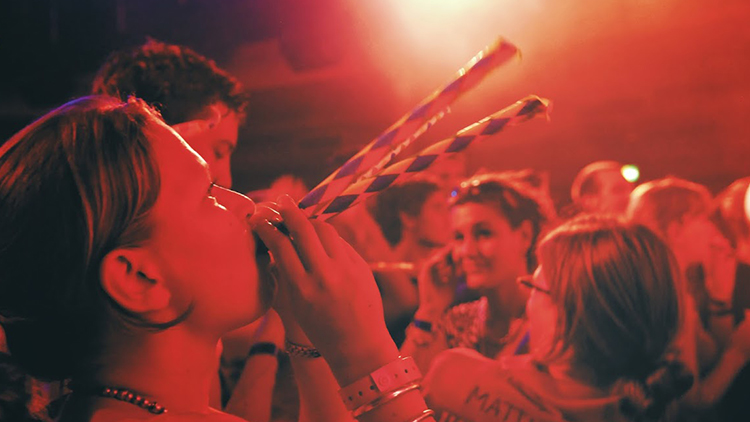 Safe nightlife
Safe nightlife
“For the UU, especially from the perspective of the (international) student community with a majority of female students, it’s incredibly important that we have a city where you can feel safe and secure. A city where you can walk the streets safely, a city with a safe hospitality industry, a city where international people feel at home and welcomed.” Therefore, the university would like to see the topic of a livable, safe city (center) high on the political agenda. It’s a recurring theme in each election manifesto, but the points of view of the parties vary more than on other themes.
The CDA says the lack of security is increasing in Utrecht. “Sadly, many population groups don’t feel safe in Utrecht. Especially the LGBT+ group is often victim of threats or even violence.” The CDA says this is “unacceptable”. The PVV also says “not to tolerate the harassment of women and gays by thugs.” The party therefore aims to introduce a “hardball approach to street harassment”. Both parties want to increase CCTV. Parties D66, GroenLinks, Evenwicht, Denk and SP are more reluctant in this – Denk and SP because of privacy issues.
Denk also states that night life facilities that discriminate should lose their licenses. D66 says that the city should not do any business with companies that discriminate. Although Student & Starter also states that they find it unacceptable that “there’s still discrimination based on gender, sexuality, religion, skin color or origin”, it’s unclear in what direction they’re looking for a solution. Other parties don’t have specific points on safety and/or discrimination.
The city should collaborate with student associations in tackling the issue of alcohol and drug abuse, the ChristenUnie manifesto states. They’re not the only party that mentions something about the population’s alcohol and drug use. D66 for instance wants coffeeshops to be normalized, soft drugs to be legalized, and the city to join an experiment in providing legal marijuana. That last point is one that both Student & Starter and the Piratenpartij agree with. GroenLinks and Student & Starter would also like to see free drug testing for visitors at festivals. That goes directly against statements of the Seniorenpartij, the CDA and Denk. The CDA does not want to offer any cooperation to regulation of marijuana cultivation, and Denk and the Seniorenpartij want the city to actively discourage alcohol, drugs and smoking.
Other points concerning the Utrecht night life:
* Student & Starter: the board members of student associations should get a discount when transferring their hospitality license to another person when a new board starts. (Associations need a license in order to be allowed to sell alcoholic beverages. The license is registered to a board member, and not the association as a whole. After every switch in board members, they have to pay to get the license registered to a new person, ed.)
* Stadsbelang Utrecht: an event in a park should not happen at the cost of local plant and animal life. People living in the area should not experience nuisance.
* PvdA: There should be a sufficient number of local area cops, especially in high-crime districts.
* VVD: There should be drive-in coffeeshop at the outskirts of the city. The idea is that a coffeeshop like that is easily accessible, and doesn’t cause any nuisance to the area. That would relieve the city center coffeeshop and lessen the current nuisances.
* Partij voor de Dieren: Parks should not be (partially) closed off for events that ask for an entrance fee. Festivals should not be allowed to use plastic disposable products, and releasing balloons and lanterns should no longer be allowed.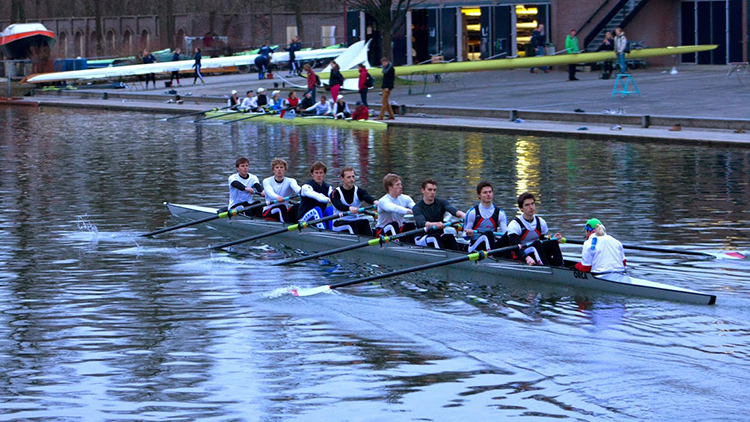
Other
The sixteen parties that participate in the elections also have points that could be relevant for students, but don’t fit within the four themes above. We mention a few:
- * Student & Starter: Students with a functional disability should not receive 100 euros but 380 euros from the city.
- CDA: International students should be informed about their rights as tenants. The city should ensure these rights are complied with.
- GroenLinks: stress among students is a growing problem. The city should collaborate with educational institutions to improve the mental health among students, for example by providing accessible sports facilities, easily accessible psychological help, and education to prevent burnouts.
- Student & Starter: Graduates are still often forced to choose (unpaid) work experience jobs, which leads to displacement in the job market. The city should act against work experience jobs and internships without any educational assignments. The city should not count internships and work experience jobs as employment in their Action Plan Youth Unemployment.
- SP: The waterways for rowing are becoming more and more scarce. Until there’s an alternative for the rowing associations, the Leidsche Rijn should not be opened up as a route for motorized boats.
- CDA: More attention should be paid to the issue of loneliness among (international) students. Livability can be improved by developing programs that assist in making students feel more at home in Utrecht.
Translation: Indra Spronk